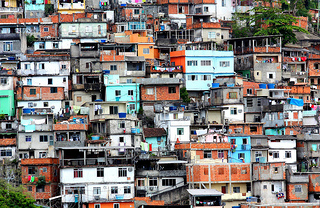Keeping Score: Social Cleansing In Favelas For The World Cup

It aims to reduce the numbers of favelas by evicting residents from their homes and, when they do not obey, by cutting municipal services like lighting and trash collections for the neighborhood.
In Rio de Janeiro, 1.4 million people live in favelas. According to government officials, residents of favelas must move out for “safety” reasons, when in fact the public knows that the evictions are a part of preparations for the World Cup and the Olympics.
Because favelas are very visible in Rio de Janeiro and because some of them are in prime locations, the city plans on gentrifying some and depopulating others.
The government is correct in recognizing the lack of safety in favelas by attempting to reduce crime, address the risk of landslides and unsustainable infrastructure, and an increase in the spread of diseases like tuberculosis. However, the government’s disregard for the difficulties favela residents have endured up to now only proves that authorities are solely interested in clearing areas for the construction of roads, stadiums, and Olympic villas.
Favelas would not exist as they do today, in the first place, if the socioeconomic gaps weren’t so wide, and if lower- and middle-class Brazilians didn’t suffer with unemployment, skyrocketing prices of real estate, lack of effective public transportation, and many others.
According to a study conducted by the Popular Data Institute, 65 percent of favela residents have been searched by the police; more than one third of them do not have any books at home, and residents have, on average, only six years of education. Residents also complained about uncertain and poor public services, scarce access to culture, and lack of proper water, lighting, and sewage infrastructure in the neighborhoods.
Brazil does not have the money needed to solve all these problems, but it can afford to start solving a few of them. Instead of evicting favela residents and forcing them to move to Rio’s peripheries, the city should be investing in better infrastructure to accommodate these people’s needs.
Providing basic sanitation, implementing better housing projects, and most important, investing on education and making sure to include children who live in the favelas, can be done with the same money and dedication given to the World Cup and Olympics preparations.
If Brazilian authorities were actually interested in the well being of its people, it would spend the money that is being wasted on hastily constructed stadiums on education and decent living conditions for its people instead. With the pressure of recent protests and foreign attention, authorities have started to be more proactive about the problems, but the main question of whether these “changes” are fleeting impressions for the World Cup and the Olympics remains.
Reach Columnist Georgia Soares here. Follow her on Twitter here.



